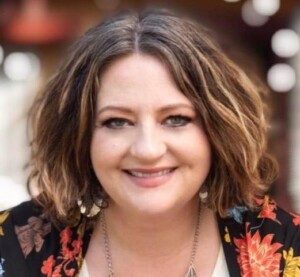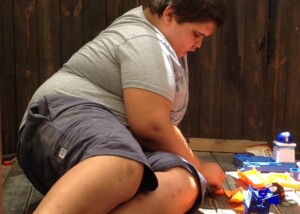Here are five ways parents can enforce the rights of their autistic or neurodivergent child’s rights in a world that isn’t quite ready to embrace them.
Prepare Your Autistic Child Mentally for Strength and Resilience
It’s so empowering to have conversations from as early as possible with our children around the uniqueness of every human being in the world, and how those differences have been celebrated.
It’s also a great idea to explore how some of the greatest leaders in history are those who were rejected by a society who were not quite ready for them.
Focusing on the strengths that got these leaders through hard times, how they were able to stay true to themselves and live out their life paths is also a wonderful way to sow seeds of strength, resilience and self-acceptance, especially in the face of potential rejection.
We know that our autistic children are exquisitely unique, and we also know that unfortunately not everyone is ready to embrace the expansiveness of our children.
The sooner we start preparing them for that, filling their minds with positive reinforcements of the gifts of their differences, and the tenacity it sometimes takes to stay true to themselves, the more empowered they will be as they journey through life.
It’s often effective and powerful to discuss these issues, planting seeds of strength to be nurtured so they are ready to bloom when hard times appear.
This lays the strong foundations upon which they build their lives, installing in them a determined sense of self so that they are ready to proudly hold their space in the world.
Some tips for spotlighting lessons of strength and resilience include:
- Highlighting those who overcame adversities in movie format can be useful.
- Reading biographies of those who overcame challenges to follow their path can be powerful.
- Completing a home-project about highlighted leaders can be a great way to connect.
Be Ready to Get Uncomfortable
Parenting is challenging. Raising incredible kids on the autism spectrum who do not fit neatly into any prescribed box is often going to incur even more challenges.
- Triggers can be misinterpreted as bad behavior.
- Meltdowns can be misinterpreted as tantrums.
- Preferences can be misinterpreted as selfishness.
- Sensory challenges can be misinterpreted as uncooperative.
As a parent, and often the voice of our child, we must get comfortable with being uncomfortable!
There will be times that we firmly, with kindness and patience, must have conversations with those in our child’s experience who may make us feel a little anxious.
These can be tricky!
We want our kids with autism to be accepted and liked. We don’t want to draw attention to them being different.
However, we must accept that this is the reality, and we need to support and empower those in our children’s orbits to recognize and amplify their strengths.
Our intention behind this kind of communication is everything. If our intention is to be defensive and righteous, we may not achieve the desired outcome.
If the intention is to inform, support and be solution focused for the benefit of everyone involved, we have a much better chance of having a successful outcome.
As a neurodiverse family, we have found that open and connected communication has been vital in “closing the gap” between where we are and where everyone else may be.
When our (until recently non-verbal) youngest began kindergarten, I was terrified.
How would our precious little bubble of joy be received by the school community?
Would they embrace or reject her for her obvious differences?
I had been shamed in public enough to understand that the sounds that she made to express excitement and joy were not always well-received by others.
With my heart in my mouth, I wrote a letter to “all her new friends and their families” (included at the end of this article) and sent it to every family in that class.
It outlined all the wonderful things about her and explained some of the more unusual behaviors that she displayed.
I wanted to increase awareness, understanding and (hopefully) empathy and connection.
As I sent the email, I felt sick to my stomach. I do not want my autistic children to be seen by society as a label… they are so much more than that.
However, I also do not want their interactions with the world to be misinterpreted and rejected.
I found the letter was received lovingly, and an outpouring of support flowed from the other parents.
It also gave them a chance to explain my child’s character to their children, increasing the understanding and connection there too.
Each time I have done this it has been positive. This helps to establish our children’s positions in the world, and shows that we are ready and willing to show up for them.
Support the Professionals
When my kids received their ASD diagnoses, we were told to share the extensive reports from the diagnosing teams with our children’s teachers.
Having my roots in the teaching profession has given me an insight into how many demands each teacher rises to meet on an hourly basis, and the dedication they gift to every child in their orbit.
I decided to unpack each document and compile a “snapshot” of how these educators could support my kids in real terms.
I sat down with each child and simply asked them a series of questions:
- What makes you feel happy/anxious/angry/frustrated/overwhelmed/scared/motivated/focused/calm?
- What would really help you in those moments?
With my children’s input, and my experience with them as a parent, we produced a very usable, clear and concise document of what the teachers could look for, and the most appropriate and effective solutions for each.
These snapshots were also gratefully and enthusiastically received and helped to set everyone up for success.
We know our kids better than anyone else in the world. Think of yourself as part of the team and respectfully share your expertise with your “teammates” so they can step forward and support your child in the most effective ways — creating the most nurturing environment possible.
Being realistic about who our child is, it’s important for their growth that we are honest about how they show up.
My kids are very clever, and there have been times when I have had to step in and reassure their teacher that firmness and boundaries were needed, as my children knew how to work the system to their advantage!
Truth be known, I actually love them for their ingenuity and resourcefulness in these circumstances.
However, I also recognize that my kids also need to be able to engage in the curriculum to truly fulfill their potential.
No part of our children needs to be labeled or denied. We are all evolving and growing constantly.
We do not need to pretend that there are no areas of our child’s experience that may need support, nurturing or growth.
For example, to acknowledge that our child is an exceptional athlete, but deny that they are not a good team player, is not helpful.
Our honest reflection of the fullness of who our children are, without feeling the need to compartmentalize or deny or negatively label any part of them, helps our team work in harmony to our children’s greater good.
I love my children fully, and I am confident in the exquisiteness of who they are to acknowledge and embrace all of them.
When we do this as parents, we give our children permission to do the same.
Speak Even when It Terrifies You
There may be times when your neurodivergent child faces rejection and even prejudice.
We have suffered through those experiences, and they broke my heart into a million pieces.
As a parent, I have been openly chastised by members of the public for being incompetent when out in public with my children.
There have been times when one of my children has had a sensory meltdown in a store, and I have sat on the floor and held them until they have calmed down and regulated.
There have also been occasions when my non-verbal children have expressed joy, and members of the public have found it offensive.
Those times, I tend to just smile at the aggressor, understanding that they do not have the knowledge to empathize, and I unapologetically hold that space for my child.
They have as much right to be in this world as anyone else, and it’s important that I do not just tell them, but I show them.
Our children have also been discriminated against by professionals.
The first time it happened, despite considering myself to be a “tough cookie,” I cried for a week!
I could not believe that my child had been treated in such an appalling way.
There was a big part of me that wanted to hide under the duvet, hide it away, pretend it hadn’t happened and move on.
Something stopped me: the thought of another family going through it, and the fact that my children were quietly watching to see what we would do next.
When the tears subsided, I got to work and pushed back…hard.
When that did not have acknowledgement or effect, I pushed up to the next level, and the next level, and continued to escalate the injustice until it was resolved to my satisfaction.
Like most people, I am not a fan of confrontation. However, there is also something deeply rooted in me that does not allow me to stay silent when I witness something that is unjust.
I believe that most of the world is good. I also believe that the few who are not doing the right things are counting on us to quietly walk away.
As parents, until our children find their voices, we must speak and be seen to be speaking for what is right, even when it’s hard and even when our knees shake. Our children are watching.
As my kids have grown, their voices have become louder, and mine quieter.
As they have stepped into their strength, resilience and confidence, I have been mindful to step back and encourage them to increasingly take the lead.
It’s their journey, and they will take from my guidance what makes sense to them.
That is the hardest and most rewarding part of the dance we share with our children, and it’s divine.
Be the Light

If we want our autistic children to take up their space in this world, and beyond, then we must be brave enough to do it for ourselves first.
We need to “geek out” and embrace our wonderful weirdness unapologetically and be unconcerned if the naysayers try to extinguish our lights.
We need to be bold, to speak and to stand for what is right. We need to know what our rights are and trust our instincts when something is not right and follow that through to a satisfactory conclusion.
We need to show up, again and again, respectfully and firmly with the view that we mean business, we know that what is going on is not right, and we will not go away until it has been resolved to our satisfaction.
- We will not be silent.
- We will not roll over.
- We will not accept anything less than we deserve.
We need to show our kids, by example, how to unashamedly love and embrace the entirety of who we are and beam that light through all that we do.
To live fully in this way is to give our autistic children the courage (and permission) to do the same.
Letter to Autistic Child’s Kindergarten Teacher and Classmates
Below is the letter to my child’s kindergarten teacher and classmates, preparing them to embrace my beautiful daughter.
It can be customized to suit any child’s specific needs and story.
Hello to my lovely new friends!
INSERT PHOTO OF CHILD.
My name is NAME and I will be five in April. I am very tall for my age and lots of grownups think that I am a lot older than I am.
I am the youngest of five children, and I live with all my family in NAME OF TOWN. I have one older sister and three older brothers.
My big sister is at university, and my big brothers are in SCHOOL the same as me! They are in years 3, 7 and 11.
I am autistic. Two of my big brothers are autistic too. This means that our brains work differently to other people’s. We feel the feelings of others very deeply because we are very empathetic.
This means that sometimes I get overwhelmed with everything that is happening, and I can get a little panicked. That is when I need a quiet, dark space to recover.
Sometimes I make loud noises to express joy. I do not mean to frighten anyone; it’s just that the joy bubbles out of me.
I cannot contain it; I am such a happy person! With help and reminders, I can quieten down.
I did not start trying to talk until I was 3 years old, and so I am a little behind, but I am learning…FAST!
I am so looking forward to listening to all you talk and to learning from you.
This is my first year in KINDERGARTEN and I am a little nervous. I have only ever been with my family, so it will be strange to be somewhere else with new people.
We do not have any extended family in Australia so I have only ever been with my family, so being in KINDERGARTEN was a big change for me to get used to, but I quickly felt right at home!
I LOVE new friends! I am VERY caring and kind. I take turns and I share with others. I am really looking forward to getting to know you all!
Lots of love,
Your new friend,
NAME
PHOTO OF PARENT
My mommy’s name is Cathy.
If ever you need to speak with her about anything her number is ______________.
 With 20+ years of experience transforming the lives of countless families in her practice as a Legacy Architect, Cathy Domoney brings her expertise to the masses. Her core philosophy is based on the delicate balance between being our children’s voice while holding them to a supremely high standard. She’s paving the way for the next generation of parents raising resilient, inspirational, intelligent and paradigm-shifting humans.
With 20+ years of experience transforming the lives of countless families in her practice as a Legacy Architect, Cathy Domoney brings her expertise to the masses. Her core philosophy is based on the delicate balance between being our children’s voice while holding them to a supremely high standard. She’s paving the way for the next generation of parents raising resilient, inspirational, intelligent and paradigm-shifting humans.
.










































